Ours is a story of hope. Of trying again and again and again. Cherishing our gifts no matter what form they come in. This is not a blog about autism, although sometimes we talk about autism because it affects our capital L Life. However, today's post IS about autism. April is autism awareness month, and there are many thoughts that have accumulated over the years I want to share. These are the words I needed to find a couple of years ago while googleing into the wee hours of the night. I also want you to know what autism can look like because it's important to know. It may affect you or people you love.
<<<<<<<<<<<<<<<<<<<<<<<<>>>>>>>>>>>>>>>>>>>>>>>>>>>>>>>
Greyson was 18 months old and something subtle was going on. I couldn't put words to it and I certainly didn't think it was called something. He didn't call me Momma or even speak really. He is my first, so I didn't really know what to expect. There were times I wondered if he loved me. He didn't notice when I left or entered the room. He didn't cry when I left the house. He didn't run to the door and greet me when I came home. I thought something was wrong with his hearing. I would call his name over and over again- sometimes inches from his face and he didn't even flinch. He no longer drove his trucks around the room- he now just stared at them from the side in fascination. He used to look at me like that, I thought longingly. I had no idea at the time, but these were all possible signs of autism. I never thought autism because he laughed and cuddled and didn't spin or rock. I thought those things saved us. I was wrong.
What is autism? It is referred to as a neurological disorder or a developmental disability. It is also called an Autism Spectrum Disorder- ASD. Since autism is a spectrum disorder, this means a child can have a variety of different behaviors to varying degrees. No two children with autism are the same. Autism currently affects 1/68 children in the US. Boys are 5 times more likely to be autistic, causes for difference in gender are still speculative.
There is no medical detection for autism. I think that's one of the most mind blowing aspects for parents. The period of waiting from the first whisper that something is different until you are told- your child has autism. There's no blood test. No brain scan. Just questions asked and small little boxes penciled in. The earliest signs of autism involve the absence of normal behaviors—not the presence of abnormal ones—so they can be tough to spot. I'm going to attempt to make something very confusing and slightly subjective into something a little more concrete. The awesome Doctor that diagnosed my oldest son Greyson did this for me. He broke it down into bite-sized pieces which helped my mind understand and heart process.
To be given a diagnosis of autism a child must have problems with communication (1) and social skills (2). They also must have rigid or repetitive behaviors that fall into line with an autism spectrum disorder (3). Let's break those further down.
COMMUNICATION: A child should begin using first words between 12- 15 months of age. They are usually words meaningful to the child. Drink. Mom. Up (with arms raised to be held). By 18 months of age Greyson had a vocabulary of about 20 words- most of them were not spontaneous, but if we said it first- he could repeat it. He did not say Momma or Dada with intent- only in random babble. He did not say more or up or drink- he could only label nouns we had repeatedly reviewed with him from flash cards, toys or books. Truck. Bird. Boat. Duck. He never labeled the items when he saw them in natural settings. Look! There's a truck! If I pointed to an object, he did not follow my point.
Communication is also non-verbal. Waving, pointing, arms raised to be held, are potential forms of communication that may be missing in children with autism. These are all red flags that should be discussed at your pediatrician's office. I brought these language concerns up at his 18-month well baby visit and I was told not to worry- the words would come. Boys often talk later, myself and so many others have been told. Since autism now affects 1 in 42 boys, boys are often late talkers is a sentence I'd like to banish from the world. A delay in communication alone does not warrant an autism diagnosis, so further digging is important. Early intervention is important because studies show that early treatment improves outcomes dramatically. It's important to voice your concerns to get any necessary Early Intervention from the state. I think it's funny that the very organization that stresses the importance of early intervention often has months long waiting lists and weeks long paper trails required to begin services. Voice your concerns, make an appointment with your State Center for people with disabilities. Yes, it's scary and it sucks- but you have to do it anyway. Your child needs you to. If by the time your appointment comes and you no longer have concerns, simply cancel your appointment.
SOCIAL: Children with autism often have poor eye contact. I remember feeding a baby Greyson- our eyes locked on one another. For both Greyson and Parker, somewhere between 15 months and 18 months of age the eye contact became less frequent. I would be inches away from their face attempting to get attention and they would look right through me.
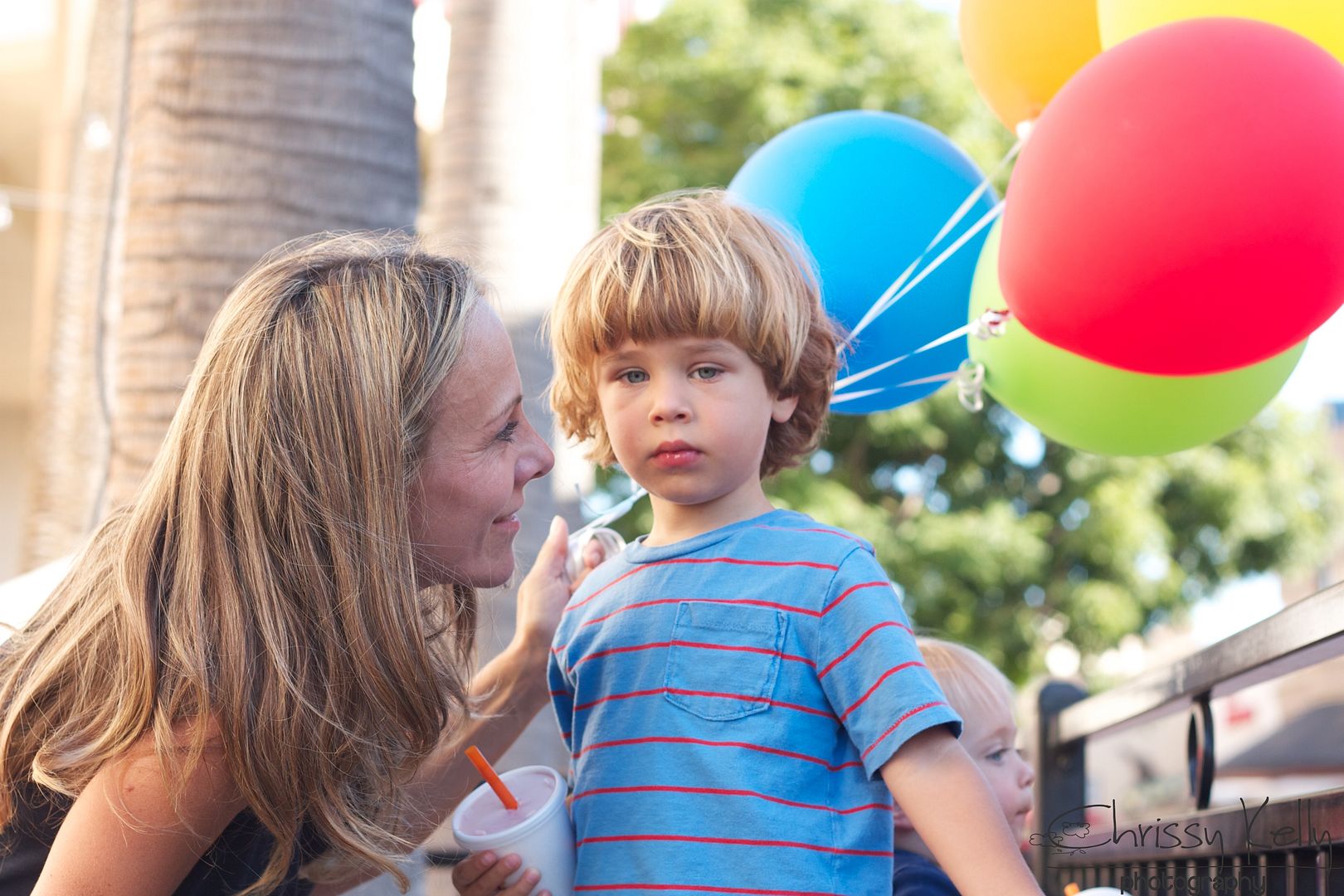
It's haunting and very different than when a typical child ignores their parent. Children with autism may not notice when you enter the room or come home from being out.
Children with autism tend to stay by themselves in social settings. If everyone is playing on the playground- they are the ones running the opposite way. Typical children are curious about other children. They watch and imitate, they attempt to join in and play- or they are shy yet still curious. Greyson and Parker are usually fine being around other kids, but they don't initiate any interactions. They aren't curious about the other kids. It's almost as like they don't exist. Some children with autism cry out and can't bear to be around other children. This is an example of spectrum thinking. From a young age children like to show things to their parents. Maybe they want to share the excitement of a toy- so they hand it to you so you can exclaim- this is wonderful! Some bring an object to the parent for help opening. These social interactions are often lacking in children with autism.
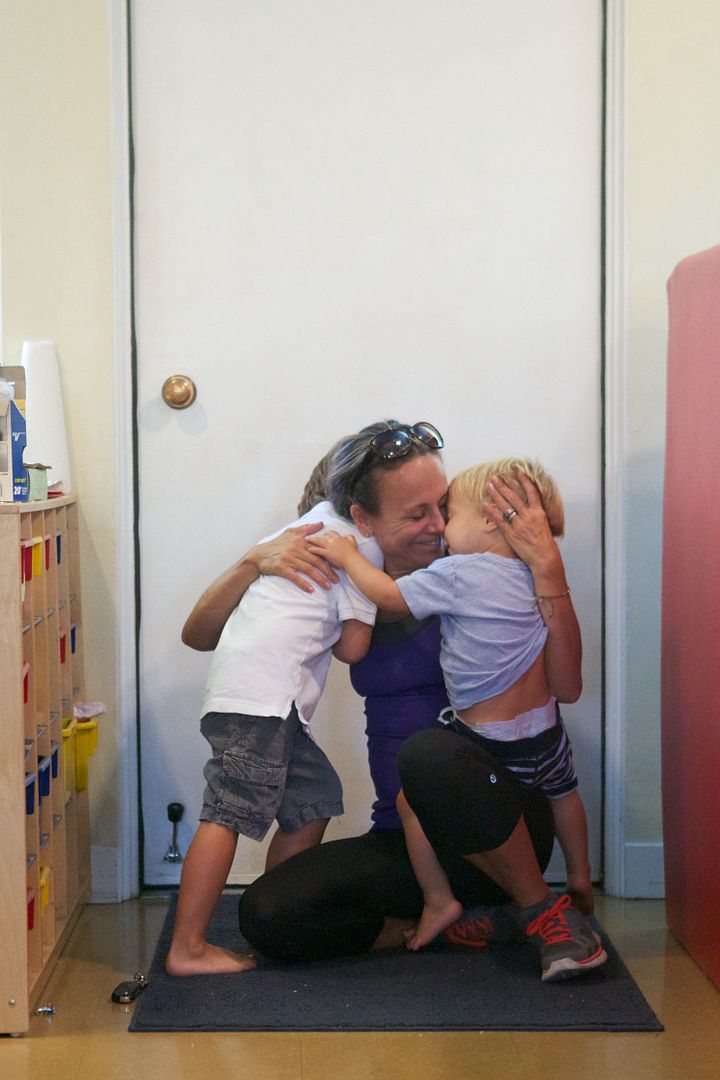
Many children with autism are very affectionate and love to give hugs and cuddle.
BEHAVIOR: Many children with autism have an insistence on same that goes beyond typical toddler opinion. Greyson can not have his hot dog cut up, he will ONLY eat it whole. You can not break a cookie in two and give him half. If he sees this happen, he screams and cries so horribly he sounds like he is hurt. He won't eat it. Greyson used to like to go to the park by the same route, he would scream if we attempted to walk a different way. This small behavior is one of the many thing that Behavior Therapy (ABA) has helped us fix.

There are numerous meltdowns over the seemingly to us- slightest things- all day long. The insistence for same and inability to communicate can make these children extremely frustrated and sad. We are teaching Greyson to say I AM MAD, when it's obvious he's mad and I AM SAD, when it's obvious he is sad. It helps him express himself in a way that isn't so draining for all of us.
Children with autism have trouble transitioning into a new situations when leaving preferred activities. This can cause epic sweating, screaming, falling to the ground tantrums. Not every so often- most of the time.
Many children with autism don't play with toys in the same way as typical children. When referring to children who are not autistic we don't call them "normal" or "regular" in comparison. Eeegads- those makes me cringe. We call them "typical" which stands for "typically developing". Now I know even typical children develop differently - but they usually fall into a standard of brackets.
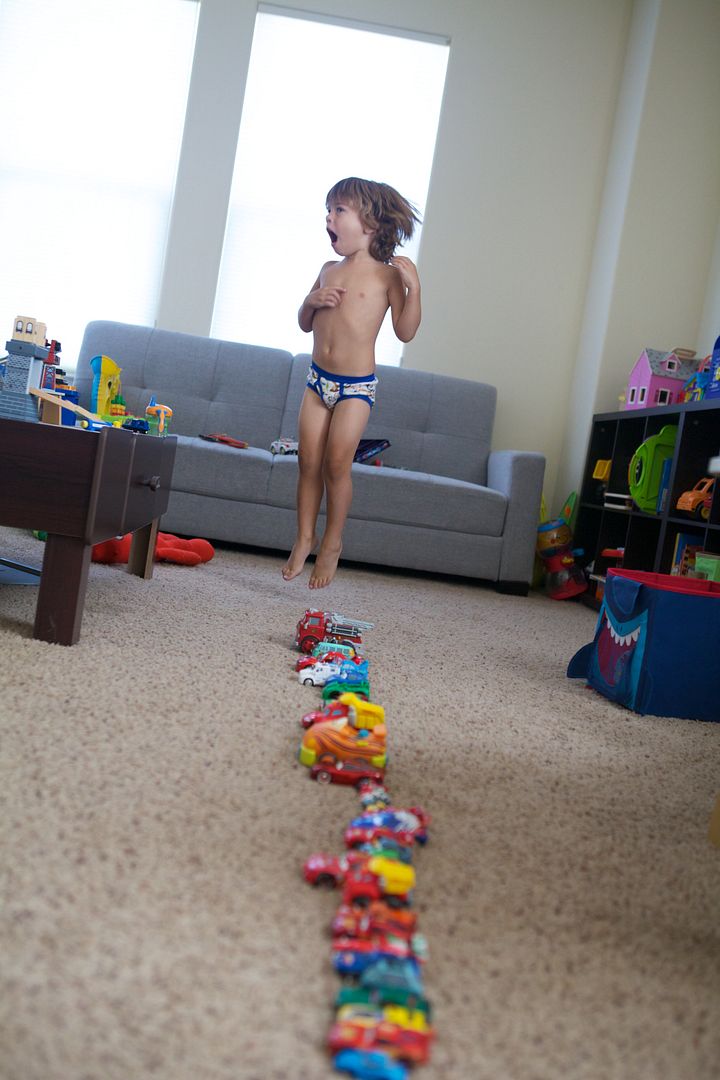
Children with autism frequently lack pretend play skills. Greyson would prefer to examine the details on a car and line the cars up than to drive them around and make them go vroom.
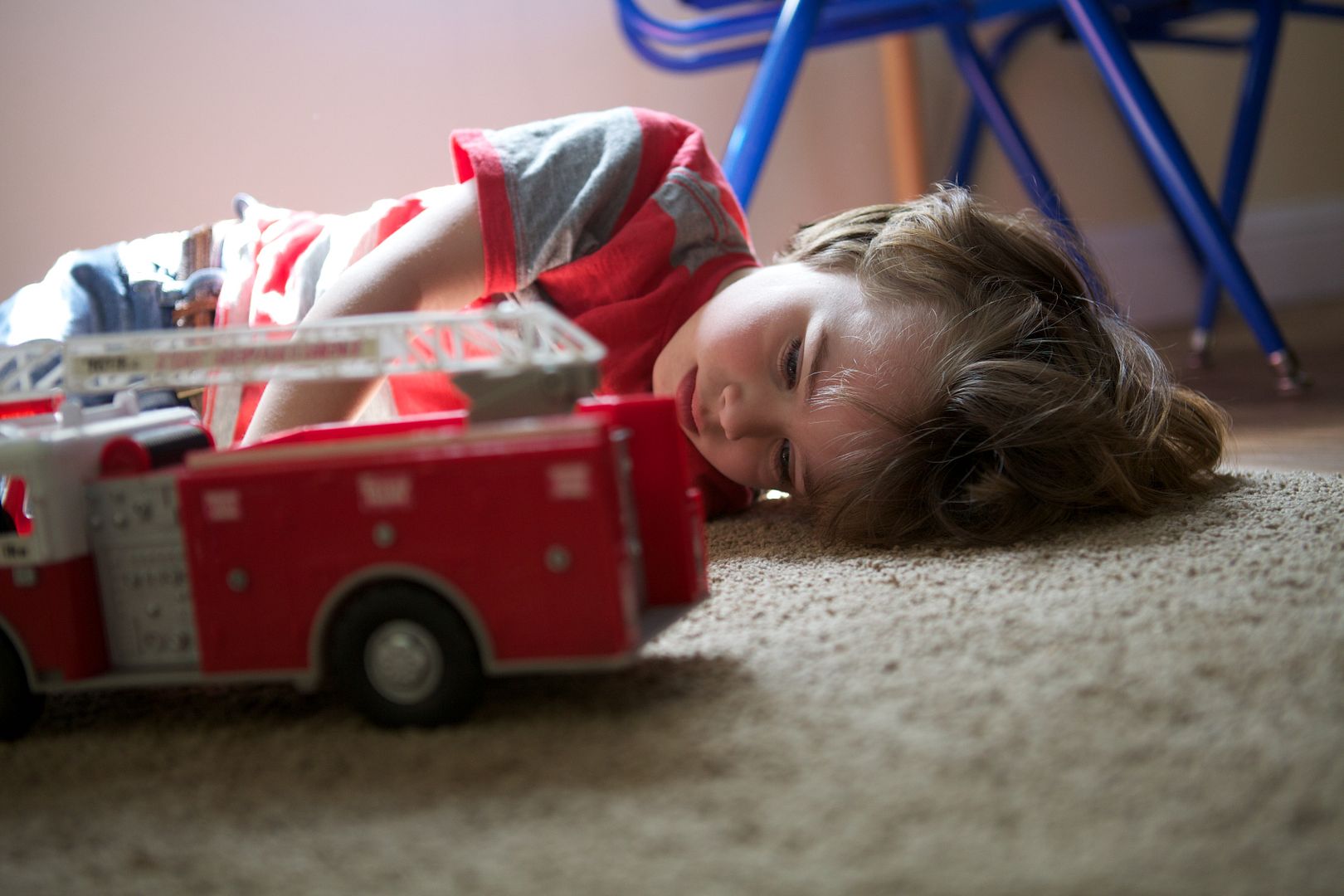
This ASD behavior is called visual stimming- Turning head sideways to look at objects, frequently squinting, looking at things extremely close up, from numerous different angles or out of the corner of their eye.
Parker does not line things up, but he likes to look at things sideways or very very close to his face. He also lacks pretend play skills. They are both frequently drawn to objects that are not toys- a salad spinner, a measuring tape, my camera tripod- and they become extremely attached to these items for a period of time.
Many kids have fixed interests that are abnormal in intensity. Greyson was obsessed with trucks and things with wheels. He was fascinated with the water dripping down the glass shower door.
Many people with autism are highly sensitive to sensory stimulation. Noises, smells, food textures and lights can be overwhelming. They may close their eyes, cover their ears or freak out- and to us it looks like it's for no apparent reason.

Greyson hates walking on grass without any shoes on.
Greyson and Parker are good examples illustrating how different even two children with autism can be. Greyson has a better handle on language, problem solving and self-help, even when he was Parker's age. Parker is more flexible, tantrums less and and has less all around overall autistic like behaviors.
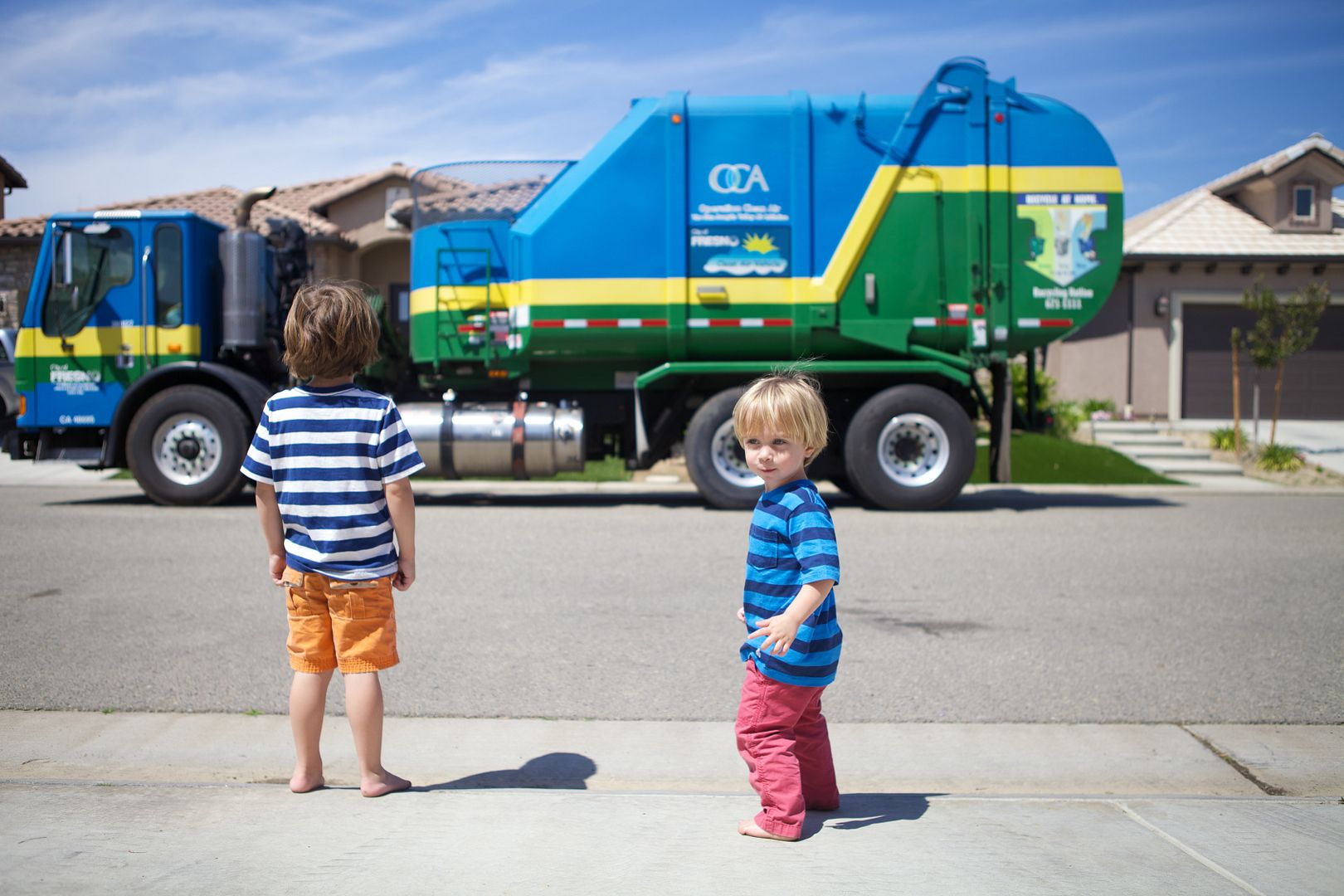
At the end of it all, we are happy. We find beauty in life's daily adventures. If you have a child recently diagnosed with autism you will find your happy again too. I promise.
Please help me share this post with your friends. You never know who may need to find these words right now. If you have any concerns about your child, call your pediatrician and make an appointment to discuss your child's development. Before going in fill out the Modified Checklist for Autism in Toddlers (MCHAT) and bring it with you.
If you have any questions you can email me at lifewithgreyson@gmail.com
Love,
Chrissy
Find me on FACEBOOK
and Instagram at @lifewithgrey

Thank you.
ReplyDeleteThank You Chrissy. This post sums it up in a nutshell. One thing you stated that is so so important is that no two Autistic people/children are the same. Just like "typical" people/children.
ReplyDeleteThank you for this. My daughter was born preemie, and all of her doctor appointment have included drilling questions to make sure she is developing "typically." I recognize now that many of the questions were related to ASD. This is really helpful information...
ReplyDeleteI know people with ASD have many struggles that typical people or kids may not have... but I look at your boys, and I think... they are on to something. When you talk about how they examine their toys or how they are extra sensitive to sensory things... I just think that they know things we don't... we can learn so much from them. Thank you for sharing your story and your magnificent kids with us.
Wow. This is wonderfully informative. So incredibly helpful for a parent who is questioning their child's behavior. Truly thank you for taking the time to put this together and share it. You are an amazing person Chrissy!
ReplyDeleteOne more important one--any regression in skills. My son has regressive autism. He met all of his milestones until 18 months and then he started to lose both verbal and non-verbal forms of communication. I kept explaining everything away--we had moved, my older kids were home for the summer, he was still super affectionate, etc. Thank you for putting together this great list for other parents!
ReplyDeleteThank you for sharing your story. I think you hit on the most important thing of all in the beginning - trust your mother's instincts! So many of us have been falsely reassured by well-meaning pediatricians, and it is critical to keep digging for answers. We never heard "boys are late talkers", but we got "Children line things up to make order of their world" and "His ears are so sensitive because he is young and they work so well", when in actuality it was Asperger's and terrible sensory problems. Like you, we've also found early interventions to be extremely helpful. Thanks again for sharing your beautiful boys with us :)
ReplyDeleteThank you for your story. My 3 yr old also loves to line his cars up too. He's now into building train tracks around the house. He could do this for hours. He doesn't play with his trains on them though, he just likes connecting the tracks together.
ReplyDelete